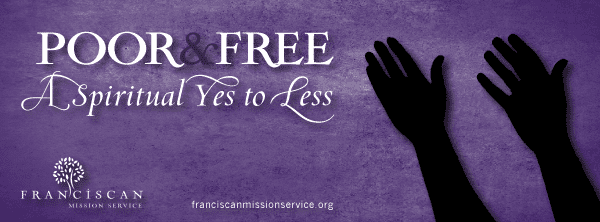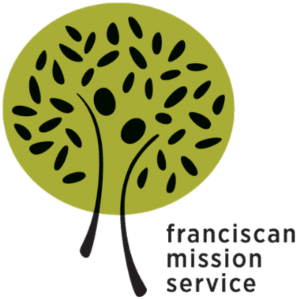Poor and Free: The Shane Claiborne Interview Part III

Franciscan Mission Service presents:
“Poor and Free: A Spiritual Yes to Less” every Friday in Lent
Series contributions:
- Shane Claiborne: Part I, Part II, and Part III
- Gigi Gruenke: “Invest in God’s Dream”
- Jack Jezreel: “The Simple Math of Voluntary Simplicity”
- Amy Echeverria: “Saying ‘Yes’ to Love”
- Sr. Marie Lucey (OSF): “Faith Keeps Hope Alive”
- Marie Dennis: “Beyond Detachment”
- Fr. Martin Day, OFM Conv.: “Letting Go of Lent”
For Lent 2014, Franciscan Mission Service presents “Poor and Free: A Spiritual Yes to Less”!
Beginning on Ash Wednesday, with an interview of social justice activist Shane Claiborne, our series contributors focus on the joyful freedom of spiritual poverty.
While Christians are called to value loving relationships over possessions, American culture can seem to promote money and materialism instead. However, the Good News is that detachment of ownership leads us to greater reliance on God which makes us more available to love and serve the poor.
Shane is one of the founders of The Simple Way faith community in Philadelphia whose members live a radical and vibrant Christianity that has inspired a generation of intentional communities. Shane is also identified with the New Monasticism movement as well as Red Letter Christianity. A prolific author and speaker, Franciscan Mission Service is honored to interview Shane about our shared values of loving, joyful faith lived through the freedom of answering God’s call with a “Spiritual Yes to Less”.
FMS: You are known for advocating direct face-to-face service as integral to a genuine response to Christ. But is it spiritually possible for a donor’s giving to be a ministry itself, to respond to God’s love through charity? How or why not?
SC: Absolutely. I think that a mark of the Spirit’s movement in us is that we begin to share. It certainly happened in the early Church that there were wealthy people that began to reallocate their resources. And there were tax collectors like Zaccheus who began to redistribute their possessions. And it was actually at that point that Jesus said, “Salvation has come.” It is a mark of salvation that we begin to share stuff. It is a beautiful vocation to be able to share and to give.
There is a great memory I have of Rich Mullins, who was very popular in the evangelical world for writing worship songs. But he was also very Franciscan. He had a little group of folks he called “The Little Brothers of Saint Frank” and he lived off of a poverty income and shared the income that his songs generated, and I remember hearing him speak one time to an evangelical college at Wheaton College in Illinois: “You guys are all into the born again thing. I am too because Jesus says that to a guy named Nicodemus. But if you tell me that I have to be born again to enter the kingdom, I can tell you that you have to sell everything you have and give it to the poor because Jesus said that to another guy, too. But I guess that’s why Jesus gave us highlighters so we can highlight the parts we like.”
It’s a powerful line.
I’m very careful to say that our works don’t earn our salvation, but I do think that they demonstrate it. They demonstrate that we have been moved by God and that changes the way we hold our stuff. And so all the way back to John the Baptist, “If you have two tunics, give one away.” Our rebirth or relationship with God changes the way we hold our stuff. Finally, what I would say is that in the end, it’s not about what we give, but how much love we put into it.
And so with charity, there is a healthy critique of charity when it is not rooted in relationships, when it is only about writing a check. In some ways, it can create a layer of insulation between real relationships, just like you can give a dollar to someone on the street without any love in it, you can give a dollar because you don’t want to talk to them, or because you want to get them off your back or you’re scared or whatever else.
It’s not just about whether or not we give money, but how much love we put into it.
When I read Matthew 25, all of these accounts that Jesus gives are about personal relationships: “When I was hungry, you fed me. When I was in jail, you visited me. When I sick, you cared for me.” And they are all about relationships with people. Giving money can never replace that fundamental call to be in a relationship with those who are most marginalized in the world. And in the end, we cannot make poverty history until we make poverty personal. And that’s the invitation for every one of us. To spread love and compassion to the most marginalized people.
FMS: Henri Nouwen said, “The poverty of Jesus is much more than an economic or social poverty. Jesus is poor because he freely chose powerlessness over power, vulnerability over defensiveness, dependency over self-sufficiency.”
What most tempts you personally, spiritually or otherwise, to choose power and control instead of vulnerability? How do you address that in your life and prayer?
SC: We’re always tempted to overstep our own calling or our own vocation or place in God’s larger plan. Some people would say to the death penalty or redemptive violence that “Scripture says ‘Vengence is mine’ and I just want to be about God’s business”. That’s exactly the point, that it’s God’s job, not mine. In a similar way, it’s possible to think that we are doing something out of our own strengths or our own gifts and we find ourselves doing something that’s more about us than it is about God. I have a friend who’s kind of a rock star and he taught me a beautiful little prayer: “God, forgive me for thinking too highly of myself. God forgive me for thinking too lowly of myself. God forgive me for thinking of myself so much.”
I like the prayer because I think one of our tendencies is if we do have influence it’s either to sabotage it or penalize it instead of trying to keep ourselves in sync with what God is doing. That’s a way that I’ve worked that out. Community is another way to keep ourselves grounded and protected from some of the temptations that Jesus faced in the desert, tempted by worldly powers to bring about change, to use “shock and awe” powers and those temptations that Jesus faced in the desert are the same ones we face today. Some of us might be tempted to turn stones into bread for really hungry people and we can be hungry for our own power instead of letting God lead us.
FMS: Many Franciscan Mission Service missioners leave successful professional careers to join our program for a two-year overseas commitment and lifelong promise to serve the poor after returning to the United States. What would you like to say to the women and men who are currently discerning a call to Franciscan Mission Service?
SC: I think that there’s a difference between a career and a vocation. A career is about finding a job that we like, or maybe we think we like, and it pays the bills. A vocation is about connecting our gifts to the needs of this world so that we can do something redemptive and beautiful for God in the world. Someone said, “We connect our deepest passions to the world’s deepest pains.” In the work [Franciscan Mission Service] is doing, you’re doing exactly that. You push to reach people in abandoned and forsaken places. The real question coming out of those experiences is not about “Am I going to be a doctor or a lawyer?” but the question is “What kind of doctor or lawyer am I going to be?” And how do I do something with my gifts that’s a part of God’s larger plan in setting the captives free, how do I participate in that? Opportunities like your mission open our eyes to better see that.
I love your crew.
FMS: When you consider all of the complexities of 21st century Christianity, what is the one thing that gives you the most hope?
SC: What gives me the most hope is that Jesus has survived all of the embarrassing things Christians have done in His name. I’m very thankful for that because while I know that a lot of us Christians haven’t had the best reputations, people still like Jesus a lot. That line that is attributed to St. Francis is “Preach the Gospel always and when necessary use words”. Many Christians have a lot to say with their mouths and not enough to show with their lives. I’m very grateful for movements like yours that try to embody the Good News with your mouths and your lives.
Tagged in:



